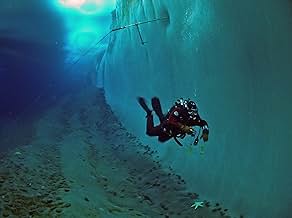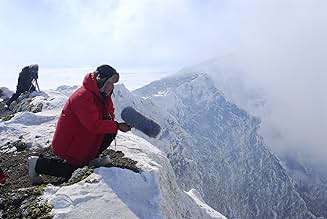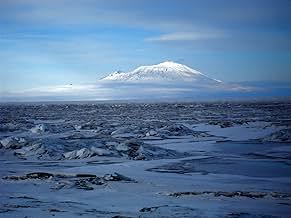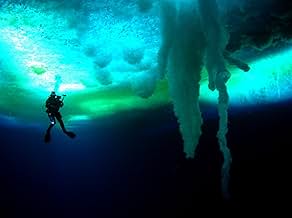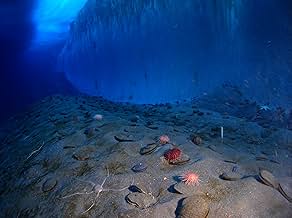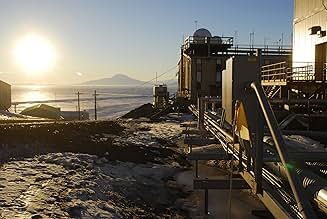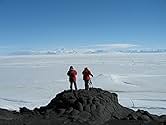Der Filmemacher Werner Herzog reist zur McMurdo-Station in der Antarktis, wo er der Schönheit des Kontinents und den dort lebenden Menschen ein filmisches Denkmal setzt.Der Filmemacher Werner Herzog reist zur McMurdo-Station in der Antarktis, wo er der Schönheit des Kontinents und den dort lebenden Menschen ein filmisches Denkmal setzt.Der Filmemacher Werner Herzog reist zur McMurdo-Station in der Antarktis, wo er der Schönheit des Kontinents und den dort lebenden Menschen ein filmisches Denkmal setzt.
- Für 1 Oscar nominiert
- 2 Gewinne & 16 Nominierungen insgesamt
- Self - Glaciologist
- (as Douglas MacAyeal)
- Self - Filmmaker, Cook
- (as Ryan A. Evans)
Empfohlene Bewertungen
Almost a companion piece to Herzog's earlier poem-like Fata Morgana, the film brings us into a world hidden to almost all but a very chosen few.
There are incredible exchanges between Herzog and his human subjects, who are all researchers studying various aspects of the Antarctic eco-sphere. One such exchange with a cell biologist involves the idea that humans evolved from the ocean to escape what the scientist terms the 'absolute horror' of existence among the extremely vicious, often microscopic 'monsters' that savagely fight for their existence in the frozen waters. Some of these creatures are shown in remarkable underwater photography and it's not hard to see what he means.
Another interview that I found both terrifying and fascinating was one with a journeyman plumber (who also is allegedly related to the Ancient Aztec royalty) about the effects of global warming. I didn't like 'An Inconvenient Truth' and have always been somewhat on the fence about global warming. But the way this man describes global warming set the hairs on my arms on end. The subject is returned to later in the film with several scientists advocating an even bleaker outlook on the topic. Their consensus is that we have already tipped the point of no return and that our existence as humans is already marked for extinction.
As one glacierologist, pointing at a radar screen showing formations of large glaciers puts it: "I don't want to know what happens when that melts." By the way, did you know that seal calls are like the sound of Moog synths and earlier Pink Floyd? I haven't even scratched the surface of this film. There are so many breathtaking moments of sheer rugged beauty that it will bring tears to your eyes.
Do not see this movie on video or DVD. Unlike 'Grizzly Man' which was more of a television format film, "Encounters At the End of The World" is deeply, deeply cinematic.
How many Bat-films do you need to see anyway? Do your brain a favor and lose yourself in 'Encounters at the End of The World'.
Best film of '08 hands down.
This is a large canvas, perhaps slightly difficult to put in proper words. Above all, all of the ideas and thoughts within the movie stems largely from the viewer's own imagination, Herzog is merely - with his warm and serious, yet inexplicable witty, narration - planting the mental seeds and asking the questions, some rhetorical and some forever impossible to answer. And it is remarkable how he does this, how this film is designed. All throughout, Herzog moves about like a genuine tourist and at the beginning I am surprised how spontaneous the whole idea feels, almost as if I am actually watching a private home video made for personal remembrance. The only difference being of course, that it would be the kind of home video Herzog would make. And be that as it may, this is still a great movie, because it continues from this elementary first stage of how he travels to the station, combined with stock footage of the explorers of the 1800s, into that of a true thinker's exploration in a romantic setting. The form of the film gradually evolves, first small steps with the reality of the small, modern society that has been developed, the paradox of a restaurant with a beloved ice-cream machine (needless to point out further, and despised by Herzog), and with a scene of people having an unusual way of training, in case they would get lost in a blizzard. From then on, at least I was hooked and from these minor steps of humanity looking itself, if but slightly, in the mirror, the movie blossoms into a greater and greater abyss of questions that human beings will always feel the hunger to answer, questions they never will be able to answer but questions that human beings will always need to have.
Human beings, now there's another thing. Herzog encounters a lot of inhabitants of the station and gets to know them, and while not to say that there aren't interesting people throughout the movie, but here we have the adventurous woman who has her own party trick where she amuses people by becoming luggage. She has many stories to tell, like how she hitch-hiked from USA to Africa in a sewer pipe. Another man claims he once survived getting killed by the mayans . There are others with less dramatic things to say. Like one of the biologist divers, slightly sad since he's decided that at that very day he will perform his last dive. He feels like his job is done. Another man is simply showing how he has two fingers of the same length, which would prove that he's got Aztec blood in his veins. Or so they say.
You might understand what I'm getting at. In these very sequences of utter realism, we do get to feel the fresh air of a normal day out at the Antarctica. And it helps settle the notion that this is a film about humanity. We are constantly in the real world, with real people, in contrast to Grizzly Man (2005), Herzog's previous nature documentary, where we were indeed surrounded by breathtaking nature, but we were also viewing the Timothy Treadwell show, put on by the star persona of himself, if there ever were another. Here we meet the actual answer to Treadwell's love to nature. Science, philosophy, mere being in the never ending light over the ices. Herzog seems very much in love with nature, be it ice skies underneath the surface, or active, thundering volcanoes or just the remarkable penguin scene that could break your heart (even Herzog could not resist one of those sentimental scenes directed by nature, despite even claiming early on that this is "not a penguin film"). It may be penguins, but it's hauntingly beautiful nonetheless.
Throughout the movie, Herzog keeps expanding his view on nature and humanity until we reach the end, and the topic we've all been waiting for. The climate change. As you'd expect though Encounters at the End of the World is by no means a propaganda film, it would obviously be beneath Herzog's dignity. No, it seems like Herzog quietly accepts that mankind might be headed for doom - it's as natural as the deranged penguins leaving it's flock to never return - and instead asks what alien lifeforms might think of our remains if they would land to explore in thousands of years. Yes, the explorations goes on. And I think it is importance to remember that the end of the world is not the end of the world. Mother Earth will be alright. She has all the time in the universe. Makind however, we may be getting near the end. I can't help but feel, when I see the colossal, wide, arctic images and the spreading cancerstain of urbanism, that after all mankind has done, Mother Earth deserves to be left alone for a while. There has to be some peace and quiet in the Universe. If the aliens do land, and they do study our hideouts, and they do feel confused over finding a fish deep down in a tunnel in the Antarctica; I'd suggest they'd watch Encounters at the End of the World.
Interestingly, it seems that this is less by design than by accidents that occur because he chooses to put his camera in places where the cosmos is unstable. Sometimes it rewards deeply, because we find our own window into beautiful chaos. Sometimes the experiments fail, and you can see how he has tried to distract us with observations from himself rather than the world he has placed us in.
This is such a failure. He goes, enticed by the promise of cruel, unfathomable beauty. He finds no accident with inherent narrative, so he inserts his own. Unfortunately, Herzog the man and mind is the least interesting element of any Herzog film. I know I am in the minority here, because he has a celebrity persona.
But watch this, and see how he interviews his subjects. He is trying to cast them as beautiful souls doomed be a part of the ugliness of humanity. Some of the interviews are staged or rehearsed. He admits this. I know the words are genuinely from the people who speak them, but the narrative is false. Herzog has this notion — this essentially Austrian notion — that nature is only full when it is cruel, stark and dangerous. Humanity is unnatural; only a few butterfly souls escape, and they are to be cherished.
So look here: we have his usual Wagnerian chorus, using internationally fused sounds. We have some nature, always presented as cosmically unfriendly. We have episodes that underscore the hopeless weakness of society. And we have characters that engage and inspire. But it all seems so desperately constructed here. Whether he likes it or not, he has simply made a penguin film, but with humans.
Ted's Evaluation -- 2 of 3: Has some interesting elements.
My complaints are essentially twofold. First, the movie is disjointed. It is a hodgepodge of Herzog's encounters with various Antarctic researchers and residents; there is no apparent order or theme. This is a minor criticism, as most of the segments make for fine viewing on their own, but it would have been more satisfying if Herzog had presented a unifying thesis or two about the Light Continent (aside from the oft-repeated observation that it is populated by a fair number of "professional dreamers"). He should have at least arranged the segments in a clearly meaningful sequence. At its best, the film made no more of an impression on me than "that was beautiful," "that was cool," or "I didn't know that." Second, and more significantly, Herzog's narration is at times irritating. As someone who has studied climate change, I share his frustration and pessimism. But there is no call for saddling the film's final moments with apocalyptic platitudes (e.g., "the end of human life is assured") and a cursory reference to global warming. These sentiments are incongruous with the rest of the film, which does not substantially address environmentalism and whose most haunting scene is of a mad penguin that abandons its flock and runs inland towards distant mountains, to certain death, with a singular determination. Herzog's doomsayings, in any event, are better communicated by the satellite images of rapidly melting polar ice that we observe on a climatologist's computer screen. I know that Herzog is capable of more measured reflections on the impersonal and uncontrollable power of nature; for example, from Grizzly Man: "what haunts me is that in all the faces of all the bears that Treadwell ever filmed, I discover no kinship, no understanding, no mercy. I see only the overwhelming indifference of nature. To me, there is no such thing as a secret world of the bears. And this blank stare speaks only of a half-bored interest in food. But for Timothy Treadwell, this bear was a friend, a savior." In Encounters, Herzog superficially and self-indulgently overstates his case. I'm looking forward to his next film.
It focuses predominantly on the odd collection of people drawn to live in an Antarctic research station, and to a slightly lesser degree on the oddness of the region itself, and the bizarre bits of scientific trivia that can be found there. Then there the bonus meanderings about the ultimate doom of humanity and whether we originally emerged from the sea onto land to escape the "horror" of marine ecosystems.
Many of its parts are fascinating, but for me, it didn't quite come together as a whole. It drifted in a lot of different directions, but seemed overall to be lacking in focus a bit. There were also a couple of elements that disturbed me a little - one was the inconsistency of talking about how humanity is destroying itself one moment, and then bashing "tree huggers and whale huggers" the next. I guess it's OK to notice that we're damaging the world, but not to try and do something about it? The other was that in some cases he seemed to be going out of his way to depict the people he interviewed in embarrassing ways, with things like leaving the camera lingering on them after the interview appeared to be finished, as they stood nervously, apparently trying to figure out if it was over or not.
But on the whole I would recommend it -- the flaws are offset by some impressive visuals (especially the underwater footage), dry humour, interesting ideas to ponder, and a really great soundtrack by Henry Kaiser and David Lindley, which work very well with the oddness of the content.
Wusstest du schon
- WissenswertesWerner Herzog dedicated the film to Roger Ebert, who he calls a true "warrior of cinema". Due to the dedication Ebert could not review the film, but he wrote a complimentary letter to Herzog and later published it.
- Zitate
[last lines]
Stefan Pashov: There is a beautiful saying by an American philosopher, Alan Watts. He used to say that through our eyes the universe is perceiving itself, and through our ears the universe is listening to its cosmic harmonies. And we are the witness to which the universe becomes conscious of its glory, of its magnificence.
- VerbindungenEdited from Formicula (1954)
- SoundtracksPlanino Stara Planino Mari
Written by Stefan Dragostinov
Performed by The Philip Koutev National Folk Ensemble
Top-Auswahl
- How long is Encounters at the End of the World?Powered by Alexa
Details
- Erscheinungsdatum
- Herkunftsland
- Offizieller Standort
- Sprachen
- Auch bekannt als
- Encounters at the End of the World
- Drehorte
- Produktionsfirmen
- Weitere beteiligte Unternehmen bei IMDbPro anzeigen
Box Office
- Bruttoertrag in den USA und Kanada
- 944.933 $
- Eröffnungswochenende in den USA und in Kanada
- 17.730 $
- 15. Juni 2008
- Weltweiter Bruttoertrag
- 1.205.464 $
- Laufzeit
- 1 Std. 39 Min.(99 min)
- Farbe
- Sound-Mix
- Seitenverhältnis
- 1.78 : 1







